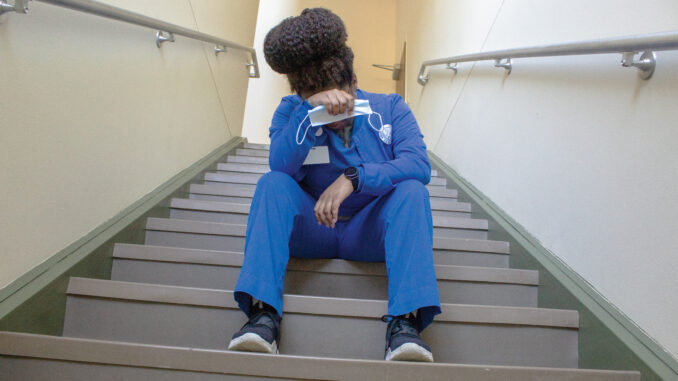
Photo Illustration by Arine Garin | The Ranger
Surge in hospitalized COVID patients weighs heavily on caregivers
By Jo Early
Online Editor
Nursing burnout continues to surge as hospitals become overwhelmed with COVID-19 delta variant patients. Hospitals and nursing homes across the country are reporting staffing shortages, and nurses are struggling to choose between taking extra shifts and taking time for themselves.
“I currently work as a patient care tech at BSA, and we are seeing the signs of it everywhere,” Kayla Fuller, an Amarillo College nursing major, said. “With all staff, not just the nurses, there are staffing shortages all over the hospitals.”
AC nursing instructors are learning to adapt and prepare for the future.
“Staffing shortages have decreased the amount of core staff available to precept the new graduates,” Verena Johnson, a professor in the nursing program, said. “What we found in the ICU is that the traveling nurses had a good knowledge base and liked to teach just as our core staff do.”
Jesse Neel graduated from AC with her associate degree in nursing in December 2018 and passed her boards January 2019 to become a registered nurse. She currently works in pediatrics.
“The issue with this is that many people have either left to work for travel companies or left the nursing field altogether, which means that facilities across the board are experiencing a major staffing shortage,” she said. “So many nurses are being required to work extra shifts or take on heavier, and potentially unsafe, assignments.”
Fuller said her class recently discussed how to spot burnout and ways to cope.
“I encourage those who maybe struggling with stress and burnout to find what’s right for them,” she said. “Take the time to find even just one thing every day that brings you joy. Whether you’re a student, a parent, a teacher or a nurse. Burnout is not just for health care, so remember to take care of yourself, because you are so very important too.”
Fuller said she is more motivated than ever to continue her education and begin working as a nurse.
“I think it is even more important now that we finish what we started and join the field,” she said. “One of the biggest things we are taught in school is how to be a patient advocate. The first strain did not affect children in the same ways as this new delta variant has. I feel like we owe it them to advocate for their safety.”
Neel encouraged students with passion for caring to keep going.
“There will be days that you will be exhausted, you’ll go home and cry because of the patient you couldn’t do anything for, you’ll feel like you should have done more, and some days you won’t feel like you’re enough and you’ll question why you chose health care,” she said. “But when you do have those patients who pull through and you know that you helped them get there it makes all of the blood, sweat and tears you’ve poured into this job worth it.”

Leave a Reply